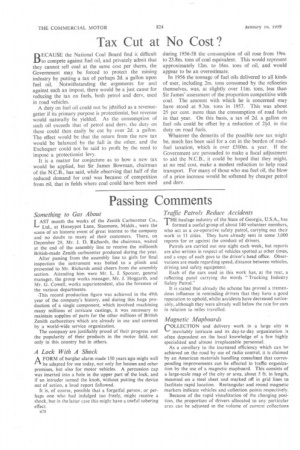Tax Cut at No Cost ?
Page 32

If you've noticed an error in this article please click here to report it so we can fix it.
BECAUSE the National Coal Board find it difficult to compete against fuel oil, and privately admit that they cannot sell coal at the same cost per therm, the Government may be forced to protect the mining industry by putting a tax of perhaps 2d. a gallon upon fuel oil. Notwithstanding the arguments for and against such an impost, there would be a just cause for reducing the tax on fuels, both petrol and derv, used in road vehicles.
A duty on fuel oil could not be jirstified as a revenuegetter if its primary purpose is protectionist, but revenue would naturally be yielded. As the consumption of such oil exceeds that of petrol and derv, the duty on these could then easily be cut by over 2d. a gallon. The effect would be that the return from the new tax would be balanced by the fall in the other, and the Exchequer could not be said to profit by the need to impose a protectionist levy.
It is a matter for conjecture as to how a new tax would be applied, but Sir James Bowman, chairman of the N.C.B., has said, while observing that half of the reduced demand for coal was because of competition from oil, that in fields Where coal could have been used during 1956-58 the consumption of oil rose from 19m. to 23.8m. tons of coal equivalent. This would represent approximately 12m. to 16m. tons of oil, and would appear to be an overestimate.
In 1956 the tonnage of fuel oils delivered to all kinds of user, including 2m. tons consumed by the refineries themselves, was, at slightly over 11m. tons, less than Sir James' assessment of the proportion competitive with coal. The amount with which he is concerned may have stood at 9.3m, tons in 1957. This was about 25 per cent. more than the consumption of road fuels in that year. On this basis, a tax of 2d. a gallon on fuel oils could be offset by a reduction of 21d. in the duty on road fuels.
Whatever the demerits of the possible new tax might be, much has been said for a cut in the burden of roadfuel taxation, which is over £300m, a year. If the Government are persuaded to make a fiscal adjustment to aid the N.C.B„ it could be hoped that they might, at no real cost, make a modest reduction to help road transport. For many of those who use fuel oil, the blow of a price increase would be softened by cheaper petrol and derv.








































































































